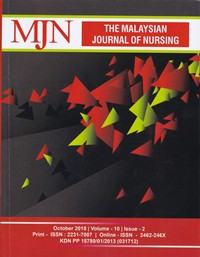
Jurnal
Effect of an Educational Supportive Program on Self-Esteem and Marital Relation Among Women Undergoing Hysterectomy
Hysterectomy is the surgical removal of the uterus. It may also involve the removal of the cervix, ovaries, fallopian tubes and other surrounding structures. It is the second commonest surgical operation experienced by women worldwide that associated with low self-esteem and sexual dysfunction. Aim: The aim of the current study was to study the effect of an educational-supportive program on selfesteem and marital relation among women undergoing hysterectomy. Methods: Aquasi-experimental one group Pretest-posttest design was adopted in this study. Setting: This study was conducted in the Gynecological outpatient clinic at Fayoum University hospital, Egypt. Subjects: Atotal of 60 women who had undergone hysterectomy and their husbands who accompanied them were included in this study. Tools: Five tools were used to collect pertinent data: I. Women structured interviewing questionnaire, II. Health Assessment questionnaire. III. The Rosenberg Self-Esteem Scale, IV. Marital Relation Questionnaire, and V. Spousal Support Scale. Results: The mean age was 42.8 ±11.3 years for women and 47.3±9.4 years for their husband. The main reason for undergoing hysterectomy was bleeding (53.3%), followed by fibroid (18.3%), and uterine prolapse (15%). The level of self-esteem and marital relation were also improved after the intervention (one month and three months later) with statistically significant differences. Conclusion: self-esteem and marital relation improved after educational supportive program. Recommendations: It was recommended that the components of an educational-supportive program should be integrated as a main part of the women' treatment plan provided to women who undergo hysterectomy. Further researches are needed to replicate the study using a larger sample size of women recruited from different geographical areas all over Egypt.
Availability
No copy data
Detail Information
- Series Title
-
The Malaysian Journal of Nursing, October 2018 Vol. 10 Issue 2
- Call Number
-
(05) 610.5 LIN t
- Publisher
- Malaysia : Lincoln University College., 2018
- Collation
-
Hlm. 11-23
- Language
-
Indonesia
- ISBN/ISSN
-
2231-7007
- Classification
-
(05) 610.5 LIN t
- Content Type
-
-
- Media Type
-
-
- Carrier Type
-
-
- Edition
-
Vol. 10 Issue 2
- Subject(s)
- Specific Detail Info
-
-
- Statement of Responsibility
-
-
Other version/related
No other version available
File Attachment
Comments
You must be logged in to post a comment
 Computer Science, Information & General Works
Computer Science, Information & General Works  Philosophy & Psychology
Philosophy & Psychology  Religion
Religion  Social Sciences
Social Sciences  Language
Language  Pure Science
Pure Science  Applied Sciences
Applied Sciences  Art & Recreation
Art & Recreation  Literature
Literature  History & Geography
History & Geography